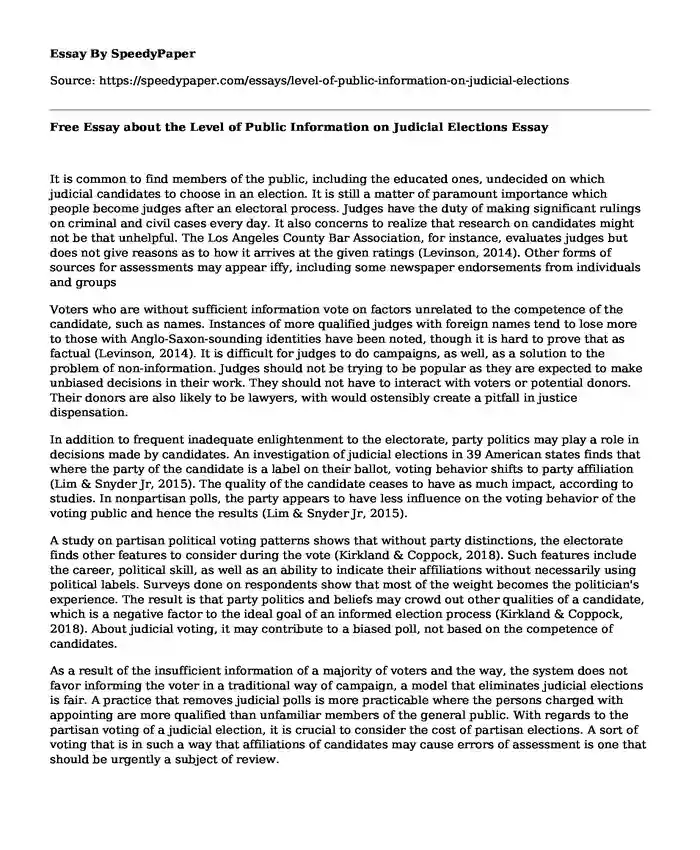
| Type of paper: | Essay |
| Categories: | Court system Civil rights |
| Pages: | 3 |
| Wordcount: | 598 words |
It is common to find members of the public, including the educated ones, undecided on which judicial candidates to choose in an election. It is still a matter of paramount importance which people become judges after an electoral process. Judges have the duty of making significant rulings on criminal and civil cases every day. It also concerns to realize that research on candidates might not be that unhelpful. The Los Angeles County Bar Association, for instance, evaluates judges but does not give reasons as to how it arrives at the given ratings (Levinson, 2014). Other forms of sources for assessments may appear iffy, including some newspaper endorsements from individuals and groups
Voters who are without sufficient information vote on factors unrelated to the competence of the candidate, such as names. Instances of more qualified judges with foreign names tend to lose more to those with Anglo-Saxon-sounding identities have been noted, though it is hard to prove that as factual (Levinson, 2014). It is difficult for judges to do campaigns, as well, as a solution to the problem of non-information. Judges should not be trying to be popular as they are expected to make unbiased decisions in their work. They should not have to interact with voters or potential donors. Their donors are also likely to be lawyers, with would ostensibly create a pitfall in justice dispensation.
In addition to frequent inadequate enlightenment to the electorate, party politics may play a role in decisions made by candidates. An investigation of judicial elections in 39 American states finds that where the party of the candidate is a label on their ballot, voting behavior shifts to party affiliation (Lim & Snyder Jr, 2015). The quality of the candidate ceases to have as much impact, according to studies. In nonpartisan polls, the party appears to have less influence on the voting behavior of the voting public and hence the results (Lim & Snyder Jr, 2015).
A study on partisan political voting patterns shows that without party distinctions, the electorate finds other features to consider during the vote (Kirkland & Coppock, 2018). Such features include the career, political skill, as well as an ability to indicate their affiliations without necessarily using political labels. Surveys done on respondents show that most of the weight becomes the politician's experience. The result is that party politics and beliefs may crowd out other qualities of a candidate, which is a negative factor to the ideal goal of an informed election process (Kirkland & Coppock, 2018). About judicial voting, it may contribute to a biased poll, not based on the competence of candidates.
As a result of the insufficient information of a majority of voters and the way, the system does not favor informing the voter in a traditional way of campaign, a model that eliminates judicial elections is fair. A practice that removes judicial polls is more practicable where the persons charged with appointing are more qualified than unfamiliar members of the general public. With regards to the partisan voting of a judicial election, it is crucial to consider the cost of partisan elections. A sort of voting that is in such a way that affiliations of candidates may cause errors of assessment is one that should be urgently a subject of review.
References
Kirkland, P., & Coppock, A. (2018). Candidate Choice without Party Labels. Polit Behav, https://doi.org/10.1007/s11109-017-9414-8.
Levinson, J. A. (2014, May 8). Why voters shouldn't be electing judges. LA Times.
Lim, C. S., & Snyder Jr, J. M. (2015). Is more information always better? Party cues and candidate quality in U.S. judicial elections. Journal of Public Economics, 107-123.
Cite this page
Free Essay about the Level of Public Information on Judicial Elections. (2022, Jul 13). Retrieved from https://speedypaper.net/essays/level-of-public-information-on-judicial-elections
Request Removal
If you are the original author of this essay and no longer wish to have it published on the SpeedyPaper website, please click below to request its removal:
- Essay Sample: Customer Experience Research
- Free Essay Sample on Water Carriers and Pipelines
- Free Essay Providing a Critical Examination of the Specified Book on Pearl Harbor
- Essay Sample on Andrew Johnson's Tragic Flaw
- Essay Example. Why Nations Fail by Acemoglu and Robinson
- Free Essay Example on Human Trafficking
- Black Lives Matter and Inequality - Essay Sample
Popular categories




